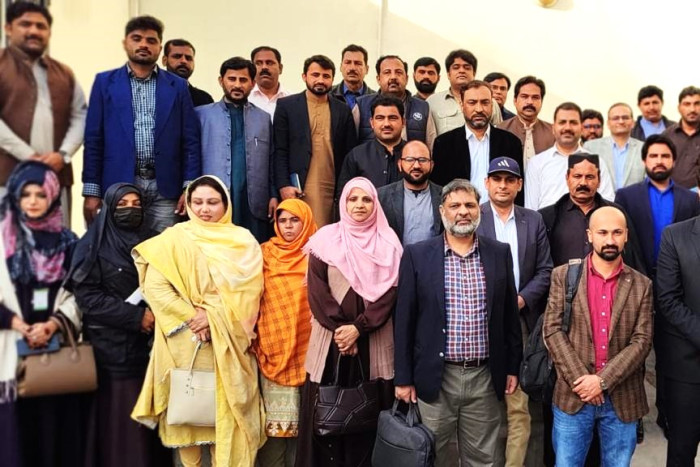
We had the opportunity to interview Maqbool Hussain, from Gopa Intec and the Deputy Team Leader for the KfW Access to Financial Services (PMIC SOLAR) project in Islamabad, Pakistan. In this conversation, Maqbool shares his insights and experiences working on a project that aims to transform energy access for rural households through the financing of Solar Home Systems.
GOPA AFC: Can you briefly describe the project you are working in?
Maqbool: The project aims to help the Pakistan Microfinance Investment Company (PMIC) implement the PMIC-KfW Renewable Energy Initiative, focusing on financing Solar Home Systems through partner financial institutions. This will improve energy access for rural households in poor grid and off-grid areas by making Solar Home Systems more affordable and ensuring high-quality supply.
GOPA AFC: How many people are in your project team and what are the various roles?
Maqbool: We have 6 international experts and 5 national experts in our team; among others a financing expert, E&S expert, climate change expert, and process facilitator/ solar expert.
GOPA AFC: How does your team collaborate and communicate on a daily basis?
Maqbool: We communicate effectively through MS Teams, emails, and WhatsApp. Our weekly meetings help us discuss and update the project's progress. International team members visiting Pakistan are crucial, and the national team is actively conducting field visits and training microfinance staff. Additionally, our technical team performs surprise visits, prepares reports, and shares updates with the donor and client.
GOPA AFC: What do you find most rewarding about your work?
Maqbool: I wanted to share what I find most fulfilling about our current project. It's incredibly gratifying to see the positive impact on our team, donors, and clients. Knowing our efforts solve problems, facilitate growth, and foster collaboration motivates me daily. Being part of a team that strives for excellence and makes a difference is truly rewarding. The continuous opportunities for learning and development keep me engaged and excited about our work.
GOPA AFC: What challenges has your team faced and how did you overcome them?
Maqbool: As you may know, Pakistan is a developing country, and our projects are in remote areas where electricity access is still a challenge, even in 2024. These 'off-grid' or 'poor ground' zones make it difficult to maintain project quality and sustainability. Key challenges include installing and maintaining solar systems and high product costs due to long-distance transportation. To address this, we are engaging more vendors and collaborating with numerous MFI experts to drive cost efficiency and improve installation quality.
GOPA AFC: Can you share a success story or a significant achievement of the project?
Maqbool: I want to highlight two significant milestones our team achieved during the project. First, we developed an Excel-based CO2 abatement tool to evaluate emissions and abatement costs, helping assess strategies for reducing carbon footprints. Second, we created comprehensive training materials for the staff of Microfinance Institutions and PMIC. Together with PMIC, we conducted three training sessions for 122 staff members.
GOPA AFC: How has the project positively impacted the local community?
Maqbool: I wanted to share some insights on how our recent solar project has positively impacted the local remote community. The installation of solar panels has significantly reduced electricity costs for residents, allowing them to allocate funds to other essential needs and improve their quality of life. The project also created local job opportunities during installation and ongoing maintenance, providing valuable skills and boosting the local economy. Additionally, the increased availability of clean, renewable energy has reduced the area's carbon footprint and promoted a healthier ecosystem. Community engagement has flourished through workshops and training sessions, empowering residents with knowledge about solar energy and sustainability. This has fostered a sense of ownership and pride among locals. Overall, the solar project has enhanced energy access, revitalized the community, and promoted economic growth, environmental awareness, and social cohesion.
GOPA AFC: What have you learned from working on this project?
Maqbool: As part of my involvement in the community-based solar project, I've gained valuable insights. Collaborating with local members underscored the importance of understanding their unique needs and perspectives, fostering trust and ensuring the project aligns with their values. I've also learned that sustainable energy initiatives contribute to environmental goals and create local jobs, boosting the economy and promoting technological literacy. The challenges we faced taught me the necessity of adaptability and resilience in project management, with each setback leading to innovative solutions.
GOPA AFC: How has this project influenced your perspective on development work?
Maqbool: This initiative has significantly influenced my perspective on development work. It highlighted the importance of community engagement and sustainable practices. By involving local residents in planning and implementation, I've seen firsthand how empowerment leads to more effective and lasting solutions. Witnessing the direct benefits—improved access to electricity and economic opportunities—reinforced my belief that development work should prioritize innovative and inclusive approaches.
GOPA AFC: What are your hopes for the future of this project?
Maqbool: I envision our project becoming a cornerstone of sustainable energy in our Pakistani community, empowering residents to harness solar power for their homes, businesses, flourmills, and agriculture while reducing our overall carbon footprint. I hope to inspire neighbouring communities to adopt similar initiatives, creating a ripple effect of environmental awareness and action. Moreover, I look forward to greater collaboration among community members, fostering a sense of ownership and shared goals. Together, we can achieve our energy targets and build stronger relationships through this endeavour.
The project is financed by KfW and jointly implemented by Intec and GOPA AFC.
For more information, please contact elena.yunatska [at] gopa-afc.de.
